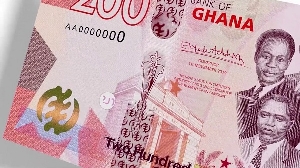Opinions of Monday, 10 February 2014
Columnist: Baafi, Alex Bossman
The falling value of the cedi
By Alex Bossman Baafi
THE RAPID FALLING value of our national currency, (the Cedi) vis-à-vis foreign currencies including the US dollar in the country has become the major concern of many well meaning Ghanaians. The US Dollar($) which sold GHc2.20 on local foreign exchange market during Christmas, last year, now sells at GHc2.60. The British Pound which sold at Ghc3.00 now sells at GHc4.20 whilst the Euro and the CFA also now sell at GHc3.50 and GHc4.80 respectively.
This macroeconomic problem that had gripped our economy today is due to a multiplicity of factors including low agricultural output, excess liquidity, trade liberalization and exchange rate policy being pursued as of now among others.
Low agricultural output is due to our inability to invest in mechanized and irrigation farming. We depend much on rain-fed agriculture; there is low incentive to farmers and high cost of agriculture inputs, all of which are contributing to low production in the country. According to report by the Ghana Chamber of Commerce and Industry (GCCI); the contribution of our agriculture sector now to Gross Domestic Product (GDP) has reduced from 40% to 22%. The sector that used to employ 60% of the workforce of our country has dropped to 50%. Our dependency on the agriculture sector for food security, employment and foreign exchange is critical to the survival of our economy. As a matter of urgency, we need to reverse the declining fortunes of this sector by investing more in this sector to earned more foreign currencies.
The excess liquidity comes about as a result of government pursuing irresponsible macroeconomic policy. If a government deliberately and excessively expand aggregate demand in an attempt to gain short term popularity with the electorate during an election year as happened to our economy during the last quarter of 2012, this is what happens. When the government decided to be irresponsible and pursued inflationary policy in the short run for political gain, during the 2012 election year; its adverse effect over the longer term has resulted to the fall in output and a rise in unemployment with its concomitant Cedi depreciation on our hands today. So we are reaping what the government sowed during the 2012 general elections.
The trade liberalization policy has crippled our manufacturing sector. Our indigenous producers could not compete with their foreign counterparts whose goods continue to flood our markets. Most of our local producers could not make sales to break even and consequently shut down. Our economy is dependent on foreign countries. We import more than we export hence the fall in the value of our currency and its attending rise in inflation. We import virtually everything including toys and toothpick.
The current exchange rate policy of the government is free-floating system where there is no central bank intervention in the foreign exchange market. The government simply let the exchange rates move freely to equilibrium automatically and instantaneously correct itself (through demand and supply) without the need for any specific policies. Under this free-floating system, the government is free to choose its domestic policy. The problems with this policy include lack of certainty for traders and investors making international trade and investments risky and Balance of Payment difficulties as well as depreciation.
Our economy now is experiencing uncertainties and lack of investments due to the falling value of the cedi and soaring inflation. This unfortunate situation is breeding grounds for speculations as both consumer and investor confidence is fast eroding. People, traders and investors prefer holding their assets in foreign denominated currencies to the detriment of our local currency, the Cedi. The demand for the foreign currencies exceeds the supply hence the depreciation of the Cedi.
Suggestions:
To halt the falling value of the cedi and reduce inflation in the immediate and long term, the government and the Bank of Ghana should carefully apply monetary and deflationary policies and legislations some of which had been discussed below.
Government
The government on her part must reduce her spending. A decline in domestic spending will induce some fall in prices which may assist the process of balance of payments and adjustment. Exports products will become more attractive to foreigners because of lower prices. Domestic substitutes for import products become more attractive also to residents because of their low prices. Again the government should give incentives to our farmers and put in place an attractive package to entice investors both home and abroad to invest more in our agricultural sector. In the short term government could prioritize mechanized rise production and mass production of poultry products.
In the area of trade liberalization, the government may limit the value of import through some selective controls such as those which specify that only a certain amount of goods may be imported over a given period, here the income that is no longer spent on imports may be diverted to the purchase of home produced goods. The fact is that even the developed nations like USA and Japan; protect some sectors in their economies. The European Union for example spends around $75 billion annually to subsidize their agriculture sector.
Bank of Ghana
Concerning the freely floating exchange rates system, Bank of Ghana should know that it has not worked to perfection in any economy in the world. Even in the developed world, the system used is called “managed” or “dirty” float where the monetary authorities sometimes intervene in foreign exchange market to either buy or sell a currency depending upon the nature of the market and its impact on their national economies.
Surveys reveal that most people prefer relatively stable exchange rate if not totally fixed, then pegged for a period of time. This brings certainty into the economy for international trade and investments to be less risky because profits are not affected by movements in exchange rates. Such ‘managed’ or ‘pegged’ exchange rate takes away speculations within the period. It will prevent the government from pursuing irresponsible macroeconomic policies and keeps inflation down. The Bank of Ghana can therefore consider this ‘managed’ system of exchange rate and be mindful that it will not conflict with interest of domestic business and the economy as a whole.
Other standard methods of reducing money supply spending are for the central bank to: Raise reserve requirement so that each Cedi of reserves support fewer Cedis of demand deposits, thereby forcing a contraction of banks' loans and demand deposits. Raise the cost of borrowing reserves from monetary authorities, which induces banks to raise interest charges to their borrowers and warn the banking community that monetary authorities desire credit restraint and. The central bank should sell securities from its own portfolio to the commercial banks, which pay for them by reducing their deposits (reserves) at the central bank and/or to the public, which pays for them by reducing its demand deposits at commercial banks. Sales to the public lead to a fall in bank reserves as the public’s funds are transferred from the commercial banks to the central bank. Again the central bank should sell Chinese currency in the foreign exchange market of our country since a sizeable imports come from China. Such a move will ease the pressure on the US dollar. The bank may also fall on the country’s reserves to inject more dollars into the economy.
Some economists argue that depreciation could be capitalized on for rapid economic growth and structural changes in the economy. That is true to some extent. When a country is import-dependent with inelastic demand and supply of exports as in the case of our country, constant depreciation of the cedi means we heading toward economic, social and political chaos. Government should get on top of the situation now before it is too late. Best wishes.












